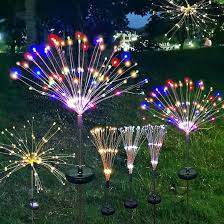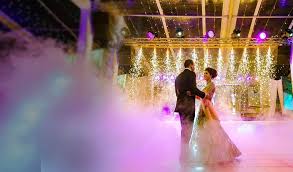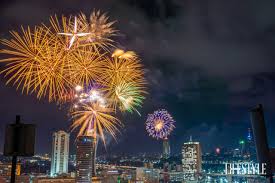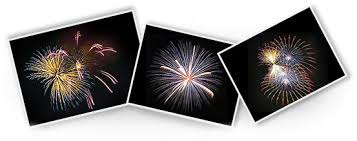Fireworks have a magical way of turning any celebration into an unforgettable spectacle. Whether it’s a wedding, corporate launch, concert, or private party, nothing says “wow” like a sky (or room) full of dazzling lights and colours. But when you’re planning a fireworks display, there’s one big question to answer: Should you go for indoor fireworks or outdoor fireworks? Both options offer their own unique advantages, and the choice you make can have a huge impact on the vibe, safety, logistics, and overall success of your event.
What are indoor fireworks?
Indoor fireworks are specially designed pyrotechnics that can be used safely inside enclosed spaces. These include:
- Cold fireworks (spark fountains that emit very little heat)
- Sparkler-style effects
- Confetti cannons and streamers
- Fog and light-enhanced visual effects
They are typically low-smoke, low-noise, and temperature-controlled, making them safe for use in venues like hotels, halls, and ballrooms.
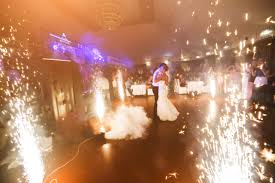
What are outdoor fireworks?
Outdoor fireworks are the classic sky-high bursts that light up the night. These can include:
- Aerial shells and rockets
- Roman candles
- Waterfall effects
- Chrysanthemum or peony bursts (those beautiful circle explosions)
They require open-air environments and ample safety clearance zones. Outdoor fireworks are louder, brighter, and visible from far away.
Indoor Fireworks: Pros and Cons
Pros:
- Weather-proof – Rain or wind can’t stop your display.
- Venue convenience – Perfect for event centres, clubs, and banquet halls.
- Noise-controlled – Great for events with kids, elderly guests, or animals.
- Visually striking at close range – Cold fireworks during a couple’s first dance? Goosebumps guaranteed.
- Customizable – Can be choreographed to music and key moments (entrances, cake cutting, speeches).
Cons:
- Limited height and spread: Effects are confined to a small space.
- Permit requirements: Still require licenses and fire-safety checks.
- Higher cost per second: More intricate setup and safety requirements.
Outdoor Fireworks: Pros and Cons
Pros:
- Bigger visual impact – Visible from far and wide—perfect for large audiences.
- Wider variety of effects – From high-flying rockets to musical choreographies.
- Traditional fireworks feel – Ideal for New Year’s Eve, national holidays, and large-scale public events.
- Scenic opportunities – Outdoor backdrops like lakes, gardens, or city skylines make for epic visuals.
Cons:
- Weather dependent – Strong winds or rain can cancel or delay your show.
- Noise concerns – Can disturb neighbours, pets, or nearby wildlife.
- Requires large clear zones – Not always suitable for venues in urban or compact areas.
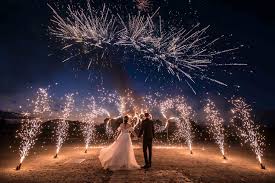
What kind of event are you planning?
The choice between indoor and outdoor fireworks depends heavily on the type of event you’re hosting:
- Weddings – Indoor fireworks work beautifully for the couple’s first dance or cake cutting, while outdoor fireworks make for a romantic grand finale.
- Corporate launches – Indoor options work better in controlled environments like hotel ballrooms or conference centres.
- Festivals and concerts – Go big or go home—outdoor fireworks are a must.
- Private parties – Smaller spaces may call for cold indoor fireworks or hybrid solutions.
Venue considerations
Your choice of venue can dictate what type of fireworks you can use.
Indoor venues:
- Must allow fireworks use (get it in writing!)
- Require high ceilings and good ventilation
- Need fire extinguishers and emergency exits in place
Outdoor venues:
- Must have enough clearance from buildings, trees, and overhead lines
- Should be approved by local authorities
- Need crowd control and emergency response plans
Always check with the venue about restrictions, and involve your fireworks vendor in early planning.
Safety and permits
Both indoor and outdoor fireworks require professional handling. Here’s what to keep in mind:
- Hire licensed providers – Never DIY your event fireworks. Use companies certified by the Kenyan authorities.
- Get the necessary permits – Whether you’re using indoor fireworks or outdoor ones, you must obtain the right approvals from the Ministry of Interior and local authorities.
- Follow fireworks safety protocols – Setup, spacing, guest distance, and fire-readiness should always be top priority.
Cost comparison
- Indoor fireworks – Generally more expensive per unit due to technical controls and tight safety requirements.
- Outdoor fireworks – Costs can vary widely based on length, complexity, and type. However, they usually give more “bang for your buck” in terms of scale and visibility.
Hybrid Fireworks Displays
Can’t choose between the two? You don’t have to. Some of the most impressive event fireworks combine indoor effects for key moments (like speeches or dances) with an outdoor grand finale. This allows you to build suspense and end with a high-impact memory your guests won’t forget.
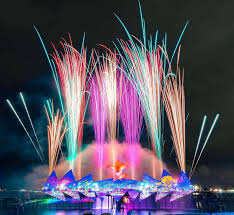
Final Verdict
There’s no one-size-fits-all answer. If your event is intimate, indoors, and focused on elegance and detail, indoor fireworks are your best bet. If you’re going for a large, open-air celebration with wide appeal, outdoor fireworks will steal the show. In many cases, combining both types can give you the best of both worlds. Just remember to plan early, work with professionals, and prioritise safety at every stage.
Fireworks Kenya can help you get the most out of every possible display for your event, whether it is an indoor event or an outdoor event. We have a vast supply of fireworks and other equipment that are suitable for and match the event at hand. We also ensure safety protocols and regulations are met, as we curate an indoor, outdoor or hybrid firework show for your big day.

